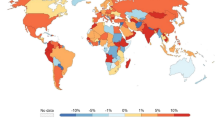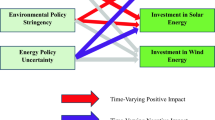Abstract
Global carbon dioxide emissions are on an upward trend, but there have been declines in carbon emissions during financial crises. The possible negative correlation between financial risks and carbon emissions will cause policy makers to face a dilemma when formulating carbon neutral policies. Therefore, it is crucial to find a middle path that can control financial risks while addressing carbon emission reduction, which can help achieve the dual goals of stable economic development and environmental protection. This empirical research studies the linear and non-linear relationships between financial risk and carbon emissions in Organization for Economic Cooperation and Development (OECD) countries, using a panel fixed effects model and a panel threshold regression model. The study further investigates the role of technological innovation and renewable energy consumption in the risk-emission relationship. Key results were as follows. First, the fixed effects model results verify that financial risk has a negative impact on carbon emissions. This relationship may be influenced by technological innovation and energy transition. Second, there is a significant single-threshold effect between financial risk and carbon emissions. When research and development (R&D) expenditures and renewable energy consumption exceed the threshold, there is a significant decrease in the contribution of financial stability to carbon emissions. Third, the slow growth of technological innovation in OECD countries compared to renewable energy consumption highlights that the potential of technological innovation for carbon reduction needs to be further explored. These empirical findings indicate that encouraging technological innovation and accelerating energy transitions would be productive new ways of thinking about the trade-off between controlling financial risk and carbon emission reduction.


Similar content being viewed by others
Data availability
The datasets used and/or analyzed during the current study are available from the corresponding author on reasonable request.
References
Acheampong AO (2019) Modelling for insight: does financial development improve environmental quality? Energy Economics 83:156–179. https://doi.org/10.1016/j.eneco.2019.06.025
Adebayo TS, Kirikkaleli D (2021) Impact of renewable energy consumption, globalization, and technological innovation on environmental degradation in Japan: application of wavelet tools Environment. Development and Sustainability 23:16057–16082. https://doi.org/10.1007/s10668-021-01322-2
Balli HO, Srensen B (2013) Interaction effects in econometrics Empirical Economics 45
Battiston S, Mandel A, Monasterolo I, Schütze F, Visentin G (2017) A climate stress-test of the financial system Nature. Clim Change 7:283–288. https://doi.org/10.1038/nclimate3255
Boutabba MA (2014) The impact of financial development, income, energy and trade on carbon emissions: evidence from the Indian economy. Economic Modelling 40:33–41. https://doi.org/10.1016/j.econmod.2014.03.005
Buchner B et al (2014) Global landscape of climate finance 2015. Climate Policy Initiative 32:1–38
Bui DT (2020) Transmission channels between financial development and CO2 emissions: a global perspective. Heliyon 6:e05509. https://doi.org/10.1016/j.heliyon.2020.e05509
Campiglio E (2016) Beyond carbon pricing: the role of banking and monetary policy in financing the transition to a low-carbon economy. Ecol Econ 121:220–230. https://doi.org/10.1016/j.ecolecon.2015.03.020
Chevallier J, Goutte S, Ji Q, Guesmi K (2021) Green finance and the restructuring of the oil-gas-coal business model under carbon asset stranding constraints. Energy Policy 149:112055. https://doi.org/10.1016/j.enpol.2020.112055
Croutzet A, Dabbous A (2021) Do FinTech trigger renewable energy use? Evidence from OECD countries. Renew Energy 179:1608–1617. https://doi.org/10.1016/j.renene.2021.07.144
D’Orazio P, Popoyan L (2019) Fostering green investments and tackling climate-related financial risks: which role for macroprudential policies? Ecol Econ 160:25–37. https://doi.org/10.1016/j.ecolecon.2019.01.029
Dalal DK, Zickar MJ (2011) Some Common Myths about Centering Predictor Variables in Moderated Multiple Regression and Polynomial Regression. Organ Res Methods 15:339–362. https://doi.org/10.1177/1094428111430540
Dietz S, Bowen A, Dixon C, Gradwell P (2016) ‘Climate value at risk’ of global financial assets. Nat Clim Change 6:676–679. https://doi.org/10.1038/nclimate2972
Fang Z, Gao X, Sun C (2020) Do financial development, urbanization and trade affect environmental quality? Evidence from China. J Clean Prod 259:120892. https://doi.org/10.1016/j.jclepro.2020.120892
FernándezFernández Y, Fernández López MA, Olmedillas Blanco B (2018) Innovation for sustainability: the impact of R&D spending on CO2 emissions. J Clean Prod 172:3459–3467. https://doi.org/10.1016/j.jclepro.2017.11.001
Gharbi S, Sahut J-M, Teulon F (2014) R&D investments and high-tech firms’ stock return volatility. Technol Forecast Soc Chang 88:306–312. https://doi.org/10.1016/j.techfore.2013.10.006
Hansen BE (1999) Threshold effects in non-dynamic panels: estimation, testing, and inference. J Econom 93:345–368. https://doi.org/10.1016/S0304-4076(99)00025-1
Jalles JT (2019) Crises and emissions: new empirical evidence from a large sample. Energy Policy 129:880–895. https://doi.org/10.1016/j.enpol.2019.02.061
Kao C (1999) Spurious regression and residual-based tests for cointegration in panel data. J Econom 90:1–44. https://doi.org/10.1016/S0304-4076(98)00023-2
Kirikkaleli D, Adebayo TS (2021) Do renewable energy consumption and financial development matter for environmental sustainability? New global evidence. Sustainable Development 29:583–594. https://doi.org/10.1002/sd.2159
Koengkan M, Santiago R, Fuinhas JA, Marques AC (2019) Does financial openness cause the intensification of environmental degradation? New Evidence from Latin American and Caribbean Countries. Environ Econ Policy Stud 21:507–532. https://doi.org/10.1007/s10018-019-00240-y
Köksal C, Katircioglu S, Katircioglu S (2021) The role of financial efficiency in renewable energy demand: evidence from OECD countries. J Environ Manage 285:112122. https://doi.org/10.1016/j.jenvman.2021.112122
Koshta N, Bashir HA, Samad TA (2020) Foreign trade, financial development, agriculture, energy consumption and CO2 emission: testing EKC among emerging economies Indian Growth and Development Review ahead-of-print
Monasterolo I, Battiston S, Janetos AC, Zheng Z (2017) Vulnerable yet relevant: the two dimensions of climate-related financial disclosure. Clim Change 145(3–4):495–507. https://doi.org/10.1007/s10584-017-2095-9
Nasreen S, Anwar S, Ozturk I (2017) Financial stability, energy consumption and environmental quality: evidence from South Asian economies. Renew Sustain Energy Rev 67:1105–1122. https://doi.org/10.1016/j.rser.2016.09.021
Paramati SR, Mo D, Huang R (2021) The role of financial deepening and green technology on carbon emissions: evidence from major OECD economies. Financ Res Lett 41:101794. https://doi.org/10.1016/j.frl.2020.101794
Qin L, Hou Y, Miao X, Zhang X, Rahim S, Kirikkaleli D (2021a) Revisiting financial development and renewable energy electricity role in attaining China’s carbon neutrality target. J Environ Manage 297:113335. https://doi.org/10.1016/j.jenvman.2021.113335
Qin L, Kirikkaleli D, Hou Y, Miao X, Tufail M (2021b) Carbon neutrality target for G7 economies: examining the role of environmental policy, green innovation and composite risk index. J Environ Manag 295:113119. https://doi.org/10.1016/j.jenvman.2021.113119
Sadorsky P (2011) Financial development and energy consumption in Central and Eastern European frontier economies. Energy Policy 39:999–1006. https://doi.org/10.1016/j.enpol.2010.11.034
Safi A, Chen Y, Wahab S, Ali S, Yi X, Imran M (2021) Financial Instability and consumption-based carbon emission in E-7 countries: the role of trade and economic growth. Sustain Prod Consum 27:383–391. https://doi.org/10.1016/j.spc.2020.10.034
Saidi K, Mbarek MB (2017) The impact of income, trade, urbanization, and financial development on CO2 emissions in 19 emerging economies. Environ Sci Pollut Res 24:12748–12757. https://doi.org/10.1007/s11356-016-6303-3
Salahuddin M, Alam K, Ozturk I, Sohag K (2018) The effects of electricity consumption, economic growth, financial development and foreign direct investment on CO2 emissions in Kuwait. Renew Sustain Energy Rev 81:2002–2010. https://doi.org/10.1016/j.rser.2017.06.009
Shao X, Zhong Y, Li Y, Altuntaş M (2021) Does environmental and renewable energy R&D help to achieve carbon neutrality target? A case of the US economy. J Environ Manag 296:113229. https://doi.org/10.1016/j.jenvman.2021.113229
Shen Y, Su Z-W, Malik MY, Umar M, Khan Z, Khan M (2021) Does green investment, financial development and natural resources rent limit carbon emissions? A Provincial Panel Analysis of China. Sci Total Environ 755:142538. https://doi.org/10.1016/j.scitotenv.2020.142538
Shi C (2003) On the trade-off between the future benefits and riskiness of R&D: a bondholders’ perspective. J Account Econ 35:227–254. https://doi.org/10.1016/S0165-4101(03)00020-X
Siddiqi TA (2000) The Asian financial crisis — is it good for the global environment? Glob Environ Chang 10:1–7. https://doi.org/10.1016/S0959-3780(00)00003-0
Su Z-W, Umar M, Kirikkaleli D, Adebayo TS (2021) Role of political risk to achieve carbon neutrality: evidence from Brazil. J Environ Manage 298:113463. https://doi.org/10.1016/j.jenvman.2021.113463
Umar M, Ji X, Kirikkaleli D, Xu Q (2020) COP21 Roadmap: do innovation, financial development, and transportation infrastructure matter for environmental sustainability in China? J Environ Manage 271:111026. https://doi.org/10.1016/j.jenvman.2020.111026
Wang Q, Dong Z, Li R, Wang L (2022a) Renewable energy and economic growth: new insight from country risks. Energy 238:122018. https://doi.org/10.1016/j.energy.2021.122018
Wang Q, Guo J, Li R (2022b) Official Development Assistance and Carbon Emissions of Recipient Countries: a Dynamic Panel Threshold Analysis for Low- and Lower-Middle-Income Countries. Sustain Prod Consump 29:158–170. https://doi.org/10.1016/j.spc.2021.09.015
Wang Q, Wang X, Li R (2022) Does urbanization redefine the environmental Kuznets curve? An empirical analysis of 134 countries. Sustain Cities Soc 76:103382. https://doi.org/10.1016/j.scs.2021.103382
Wang Q, Zhang F (2021) The effects of trade openness on decoupling carbon emissions from economic growth – evidence from 182 countries. J Clean Prod 279:123838. https://doi.org/10.1016/j.jclepro.2020.123838
Wang Q, Zhang F (2021b) What does the China’s economic recovery after COVID-19 pandemic mean for the economic growth and energy consumption of other countries? J Clean Prod 295:126265. https://doi.org/10.1016/j.spc.2021.04.024
WEF The green investment Report. In, 2013. World Economic Forum (Geneva)
Wooders P, Runnalls D (2006) The financial crisis and our response to climate change
Yu Y, Xu W (2019) Impact of FDI and R&D on China’s industrial CO2 emissions reduction and trend prediction. Atmos Pollut Res 10:1627–1635. https://doi.org/10.1016/j.apr.2019.06.003
Zaidi SAH, Zafar MW, Shahbaz M, Hou F (2019) Dynamic linkages between globalization, financial development and carbon emissions: Evidence from Asia Pacific Economic Cooperation countries. J Clean Prod 228:533–543. https://doi.org/10.1016/j.jclepro.2019.04.210
Zhang W, Chiu Y-B (2020) Do country risks influence carbon dioxide emissions? A non-linear perspective. Energy 206:118048. https://doi.org/10.1016/j.energy.2020.118048
Zhao J, Shahbaz M, Dong X, Dong K (2021) How does financial risk affect global CO2 emissions? The role of technological innovation. Technol Forecast Soc Change 168:120751. https://doi.org/10.1016/j.techfore.2021.120751
Funding
This work is funded by the National Natural Science Foundation of China (Grant Nos. 72104246, 71874203) and the Natural Science Foundation of Shandong Province, China (Grant No. ZR2018MG016).
Author information
Authors and Affiliations
Contributions
Qiang Wang: Conceptualization, methodology, software, data curation, writing — original draft preparation, supervision, writing — reviewing and editing. Zequn Dong: Methodology, software, investigation, writing — original draft, writing — reviewing and editing.
Corresponding author
Ethics declarations
Ethics approval and consent to participate
Not applicable
Consent for publication
Not applicable
Competing interests
The authors declare no competing interests.
Additional information
Responsible Editor: Nicholas Apergis
Publisher's note
Springer Nature remains neutral with regard to jurisdictional claims in published maps and institutional affiliations.
Appendix
Appendix
Rights and permissions
About this article
Cite this article
Wang, Q., Dong, Z. Technological innovation and renewable energy consumption: a middle path for trading off financial risk and carbon emissions. Environ Sci Pollut Res 29, 33046–33062 (2022). https://doi.org/10.1007/s11356-021-17915-3
Received:
Accepted:
Published:
Issue Date:
DOI: https://doi.org/10.1007/s11356-021-17915-3





